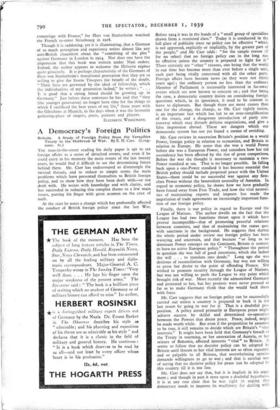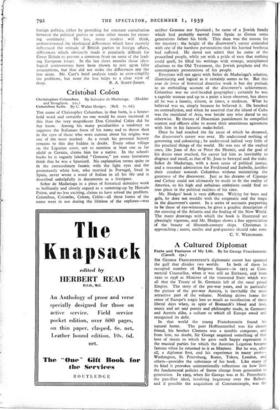A Democracy's Foreign Politics
THE man-in-the-street reading his daily paper is apt to see foreign affairs as a series of detached events, and even if he could carry in his memory the main events of the last twenty years, he would find it difficult to see the determining forces behind them. Mr. Carr has endeavoured to disentangle the twisted threads, and to reduce to simple terms the main problems which have presented themselves to British foreign policy, and to show how they have been dealt with—or not dealt with. He writes with knowledge and with clarity, and has succeeded in reducing this complex theme to a few main issues, putting his finger with great acumen on the crux of each.
At the start he notes a change which has profoundly affected the conduct of British foreign policy since the last War. Before 1914 it was in the hands of a " small group of specialists drawn from a restricted class." Today it is conducted in the full glare of publicity since no policy can be effective "which is not approved, explicitly or implicitly, by the greater part of the people," and Mr Carr adds : " for the simple reason (if for no other) that no foreign policy can in the long run be effective unless the country is prepared to fight for it." There certainly are " other " reasons, one being that the world in our time has become more than ever before a single unit, each part being vitally concerned with all the other parts. Foreign affairs have become news (as they were not thirty years ago); the ordinary person no less than the ordinary Member of Parliament is necessarily interested in far-away events which are now known to concern us ; and that being the case, a democratic country insists on considering foreign questions which, in its ignorance, it used to be content to leave to diplomats. But though there are more causes than one for the change, the change, as Mr. Carr rightly insists, is an important fact which has led to an over-simplification of the issues, and a dangerous introduction of party con- troversy which may disturb delicate negotiations, and give a false impression abroad. These are dangers which our democratic system has not yet found a means of avoiding.
Mr. Carr reviews in succession Britain's position as a world Power, foreign policy in relation to economics, and Britain in relation to Europe. He notes that she was a world Power before she was a European Power, and considers how her old ascendency has been affected by the rise of great competitors. Before the war she thought it necessary to maintain a two- Power standard at sea. That is no longer possible. In falling back upon a one-Power standard it has become essential that British policy should include perpetual peace with the United States—there could be no successful war against any first- class Power without the benevolent neutrality of America. In regard to economic policy, he shows how we have gradually been forced away from Free Trade, and how the vital necessi- ties of maintaining exports and imports has made the negotiation of trade agreements an increasingly important func- tion of our foreign policy.
Finally, there is our policy in regard to Europe and the League of Nations. The author dwells on the fact that the League has had two functions thrust upon it which have proved incompatible—that of promoting peaceful relations between countries, and that of maintaining the status quo, with sanctions in the background. He suggests that during the whole period under review our foreign policy has been wavering and uncertain, and that because " so long as no dominant Power emerges on the Continent, Britain is content to have no active European policy." " Throughout the period in question she was full of good intentions, which she lacked the will . . . to translate into deeds." Long ago she was desirous of reconciliation with Germany, but was not willing to press her desire to the point of offending France. She wished to promote security through the League of Nations, but was not willing to push the League to any point which brought risk of war. More recently she admonished Germany and protested to her, but her protests were never pressed so far as to make Germany think that she would back them with force.
Mr. Carr suggests that no foreign policy can be successfully carried out unless a country is prepared to back it in the last resort by going to war for it. That is a doubtful pro- position. A policy aimed primarily at European peace might achieve success by skilful and determined co-operation between the Powers that desire peace. Peace, indeed, might be made worth while. But even if the proposition be assumed to be true, it still remains to decide which are Britain's " vital interests." It might have been held that Germany's breach of the Treaty in rearming, or her annexation of Austria, or her seizure of Bohemia, affected interests "vital " to Britain. It seems to follow that no decisive policy can be adopted bv Britain until threats to her vital interests are so often repeated. and so palpable to all Britons, that overwhelming opinion demands willingness to go to war ; and that is another way of saying that no decisive policy for peace can be adopted by this country till it is too late.
Mr. Carr does not say that, but it is implicit in his argu- ment ; and though in part it rests upon a doubtful hypothesis. it is at any rate clear that he was right in urging that democracy needs to improve its machinery for dealing with
foreign politics, either by providing for constant consultation between the political parties or some other means for ensur- ing continuity. He has, many readers will think, underestimated the ideological-differences which have recently influenced the attitude of British parties to foreign affairs, differences which obviously made it peculiarly difficult for Great Britain to present a common front on some of the lead- ing European issues. In the last three months those ;deo- logical controversies have been shown to rest upon false assumptions, but that did not make the differences any the less acute. Mr. Carr's brief analysis tends to over-simplify the problems, but none the less helps to a clear view of













































 Previous page
Previous page